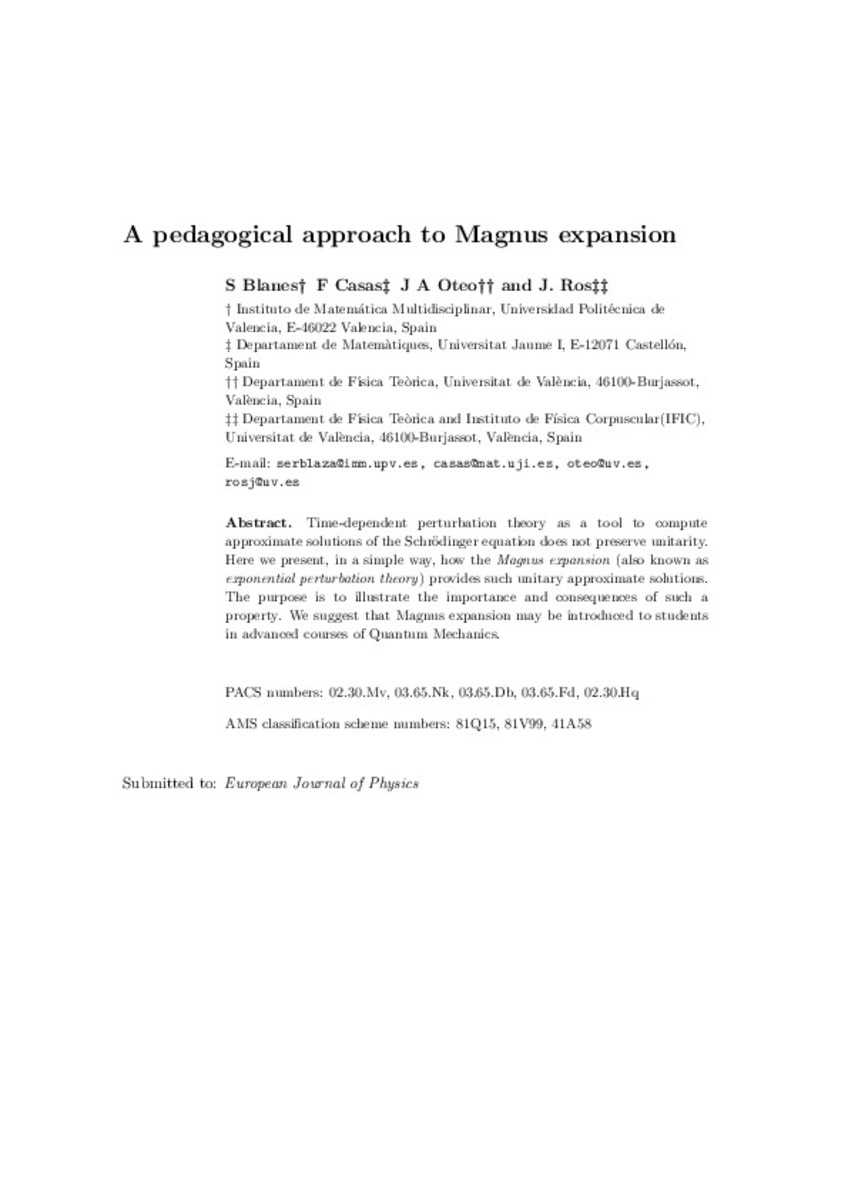Mostrar el registro sencillo del ítem
A pedagogical approach to the Magnus expansion
| dc.contributor.author | Blanes, Sergio | |
| dc.contributor.author | Casas, Fernando | |
| dc.contributor.author | Oteo, J. A. | |
| dc.contributor.author | Ros, J. | |
| dc.date.accessioned | 2012-02-17T13:13:28Z | |
| dc.date.available | 2012-02-17T13:13:28Z | |
| dc.date.issued | 2010-07 | |
| dc.identifier.citation | European journal of physics (July 2010), vol. 31, no. 4, 276-298 | |
| dc.identifier.issn | 0143-0807 | |
| dc.identifier.issn | 1361-6404 | |
| dc.identifier.uri | http://hdl.handle.net/10234/32076 | |
| dc.description.abstract | Time-dependent perturbation theory as a tool to compute approximate solutions of the Schrödinger equation does not preserve unitarity. Here we present, in a simple way, how the Magnus expansion (also known as exponential perturbation theory) provides such unitary approximate solutions. The purpose is to illustrate the importance and consequences of such a property. We suggest that the Magnus expansion may be introduced to students in advanced courses of quantum mechanics | |
| dc.format.extent | 14 p. | |
| dc.format.mimetype | application/pdf | |
| dc.language.iso | eng | |
| dc.publisher | Institute of Physics | |
| dc.relation.isFormatOf | Versió pre-print del document publicat a http://iopscience.iop.org/0143-0807/31/4/020 | |
| dc.rights | © 2010 Institute of Physics | |
| dc.rights.uri | http://rightsstatements.org/vocab/InC/1.0/ | * |
| dc.subject | Exponential perturbation theory | |
| dc.subject | Magnus expansion | |
| dc.subject | Students in advanced courses | |
| dc.subject | Quantum mechanics | |
| dc.subject.lcsh | Perturbation (Quantum dynamics)--Study and teaching | |
| dc.subject.other | Pertorbació (Dinàmica quàntica)--Ensenyament | |
| dc.title | A pedagogical approach to the Magnus expansion | |
| dc.type | info:eu-repo/semantics/article | |
| dc.identifier.doi | http://dx.doi.org/10.1088/0143-0807/31/4/020 | |
| dc.rights.accessRights | info:eu-repo/semantics/openAccess | |
| dc.type.version | info:eu-repo/semantics/sumittedVersion |
Ficheros en el ítem
Este ítem aparece en la(s) siguiente(s) colección(ones)
-
MAT_Articles [755]
Articles de publicacions periòdiques







